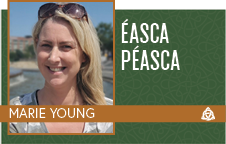
Éasca Péasca Student Stories: Mo Thuras le Gaeilge
By Gerry Walsh
Is fearr Gaeilge briste na Béarla cliste.
My grandfather was a “cainteor dúchas” or native speaker of Irish Gaelic. I never had a clue. I wasn’t around when he tried to teach all his children the prayers in Irish. I understand that they had no interest in the language, since they were all born in America and didn’t see a need for the language here. I only heard the “Éirinn go brách” resounding every Saint Patrick’s Day.
My father was quite proud of his Irish heritage, but even that did not inspire him to learn the prayers. I wonder how many of our relatives and neighbors were also native speakers in the Irish neighborhood where I grew up? But, as I said, I was clueless.
I was always interested in languages. When I was young, my uncle, who had been in France and Germany, taught me a couple basic phrases in those languages. Since I was, however, lacking in sense, I started out my career in foreign languages by asking some Cherokee dancers in Oklahoma, “Bonjour, ça va?” and, of course, they answered me in Cherokee.
I wandered away with embarrassment. Undaunted, I kept up this long-term tradition by later asking passers-by in Paris how to say “lamp post” in French (who always seemed to end up being Americans), or greeting my son’s landlords in a Spanish-speaking part of Brooklyn with a cheery “Hola, que tal?” It turned out they were Asian.
My wife suggested I stick to English. Finally, however, I found a safe niche in Irish conversation circles – ciorcail comhrá. In an effort to keep up my French and German, I did not limit my studies to Irish. So, I ended up throwing in the occasional French or German word into my Irish conversation. Quelle horreur!

When we first went to Ireland, twenty-five years ago, my wife made me swear I would not ask anyone about lamp posts. Nevertheless, we managed to visit happily every year since then, as we were in County Clare, where we were somewhat hard-pressed to find many Irish speakers. After a while, though, I found myself increasingly attracted to the Irish Gaeltachts, where Irish is the first language.
Finally, one year we drove up to the Connemara Gaeltacht, intending to spend the night and return the next day. Unfortunately, we chose a day when all the lodgings were taken due to a local event at the schools. I only got a chance to ask about lodging and whether there was other lodging available.
The next year we went again and found some shops in Spideal where I had a chance to chat briefly with the shopkeepers followed by a nice dinner at a local restaurant, where I ordered my meal in Irish. I didn’t get a real chance to stay in the Gaeltacht until the Irish instructor at University of Pittsburgh, Marie Young, arranged for me to apply for a scholarship. I stayed for a fortnight in Ceathrú Rua (Carraroe, County Galway), learning Irish in an immersive environment.
Due to flight delays, I arrived in Ceathrú Rua in the afternoon of the first day. I chatted with the secretary and another of the teachers. I was given the option of choosing whether I would go to the intermediate or advanced class.
Aware of my weaknesses, I initially chose intermediate. However, after a few days reviewing topics I had covered many times before, I decided to change to the advanced class. They were content for me to change, so I walked into the advanced class the next day.
The instructor no longer spoke a carefully pronounced, clearly enunciated, leisurely paced Irish, but, rather, I had the impression I had just stepped in front of a freight train which was rapidly bearing down upon me – her speech was so fast. She told me that everyone else had found a partner except one person and I should join him for the writing exercises.
I agreed and was shortly afterwards horrified to find I had been paired up with a person who seemed to be an Irish poet. “We” wrote a few paragraphs together, including at least one word I had contributed.
The other people in the class did not seem to have such a piece of blank verse for their contributions and I thought that I might have had a better chance paired with them. Oh well. Is ait an mac an saol! Life can throw some curves at you betimes.
I was far more content when I returned to the intermediate class the next day. At least I was in familiar territory.
The following day before I entered class, however, I was accosted by a teacher I had not seen previously. We went off to another room where we discussed whether I had any concerns and what, exactly, I would prefer to learn. We proceeded to spend the rest of the week with him checking my pronunciation (which was actually far better than I had imagined) and he had me do exercises, such as going to the far end of the long room and reading to him in a loud voice.
He informed me that a major part of my problem was my shyness and the quiet way I spoke in consequence. I had a delightful time working with him on “mo chuid Gaeilge” (my Irish). At the end of the first week, we were free for the weekend, and my wife came to spend the weekend with me. I happily related the events of the preceding week, until her quizzical expression cued me in that I was speaking in Irish (of which she understood nothing). I trust that my private instructor enjoyed that bottle of (legal) póitín whiskey I left for him outside his office door in thanks.
Since then, I have attended various Daltaí na Gaeilge Irish weekends and even one week in which, after having spent a good portion speaking with native speakers, I was awarded the gold Fáinne – a symbol of my level of oral fluency in Irish. In the same year, I received the B1 (lower intermediate) certificate from Maynooth University.
One positive change due to the pandemic: after decrying my inability to get back to the Gaeltacht for more instruction, the Gaeltacht came to me – in its own way. Since in-person classes could no longer be safely held, online classes started up; I was able to attend one class in the Waterford Gaeltacht and another in Dublin in the same week.
Since that time, I have almost always had at least one class in Irish, and more often two, every week. I am hoping I am on my way to get that B2 certificate in Irish that has been the guiding star for my efforts ever since.
*Gerry is a retired software engineer, born in Philadelphia, PA, grew up in Levittown, New Jersey before attending university for his B.A. in Theoretical math. He is married with two sons and lives in Washington County, attending Irish classes at the University of Pittsburgh.

Monthly newsmagazine serving people of Irish descent from Cleveland to Clearwater. We cover the movers, shakers & music makers each and every month.
Since our 2006 inception, iIrish has donated more than $376,000 to local and national charities.
GET UPDATES ON THE SERIOUS & THE SHENANIGANS!